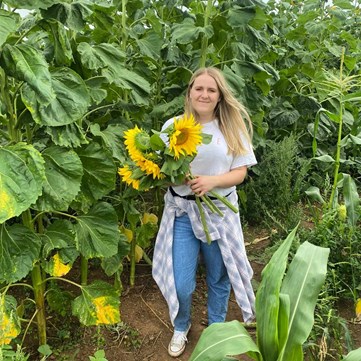Blog written by Stephanie Jones

Last year, I was fortunate enough to join the Tenovus Cancer Care team as an Insight Research Officer on a 12-week professional placement as part of my PhD with the South West Biosciences Doctoral Training Programme. I am currently entering my final year of my PhD at the University of Bath where I am investigating the role of a group of genes called long non-coding RNAs during skin development and how we can use this knowledge to understand the development and progression of a type of skin cancer called melanoma.
I chose Tenovus Cancer Care to undertake my placement with as I have been interested in cancer research throughout my academic career and I wanted to be able to gain an insight into working in a third sector organisation whilst continuing to contribute to the cancer research field. During my usual day as a PhD student, I primarily work within a lab conducting experiments so I also wanted to take this opportunity to experience a job where I could my scientific skills outside of a lab environment. Additionally, despite now living in Bath, I am originally from North Wales and have experienced the vital work cancer charities such as Tenovus Cancer Care performs in Wales. Thus, it was important for me to be able to contribute my time and scientific skills to Tenovus Cancer Care as a Welsh based charity.
After some background research and discussions with the Tenovus Cancer Care team, we found that upper gastrointestinal cancers, such as oesophageal and stomach cancer, are particularly underserved in Wales. These two cancers are also considered to be part of the ‘Less Survivable Cancers’ group due to the poor survival rates of these two cancers. Oesophageal and stomach cancer are also considered to be uniquely preventable, with 57% of oesophageal cancer and 48% of stomach cancer cases thought to be preventable in Wales. Therefore, with the help and support of the Tenovus Cancer Care team, we decided to focus our efforts on compiling a report to raise awareness of both oesophageal and stomach cancer in Wales.
Through the use of publicly available data and freedom of information requests, I conducted a search to explore how oesophageal and stomach cancer outcomes could be improved in Wales. As a result, I have compiled a report with the help of the Tenovus Cancer Care team which takes Wales specific data to propose recommendations and highlight where changes can be implemented in Wales to improve oesophageal and stomach cancer survival outcomes.
Before starting the project, I was not aware just how poor the survival rates of oesophageal and stomach cancer were and I was shocked at the proportion of these cancer being diagnosed when it is too late. There is an urgent need for these cancers to be diagnosed earlier if survival of oesophageal and stomach cancer is to improve.
I have thoroughly enjoyed working with Tenovus Cancer Care and have relished the opportunity to use my scientific skills outside of the lab. I was well supported throughout my placement and I really valued the prospect of being able to make a positive impact to the lives of cancer patients in Wales. I hope that through the dissemination of the report, a shift in focus can be made on improving the survival for those diagnosed with oesophageal and stomach cancer.
The placement has been an eye-opening experience to research outside of academia and one which I have really valued. During the placement I have been able to further develop my scientific communication and project management skills which I will be taking back to apply in my final year of my PhD.



